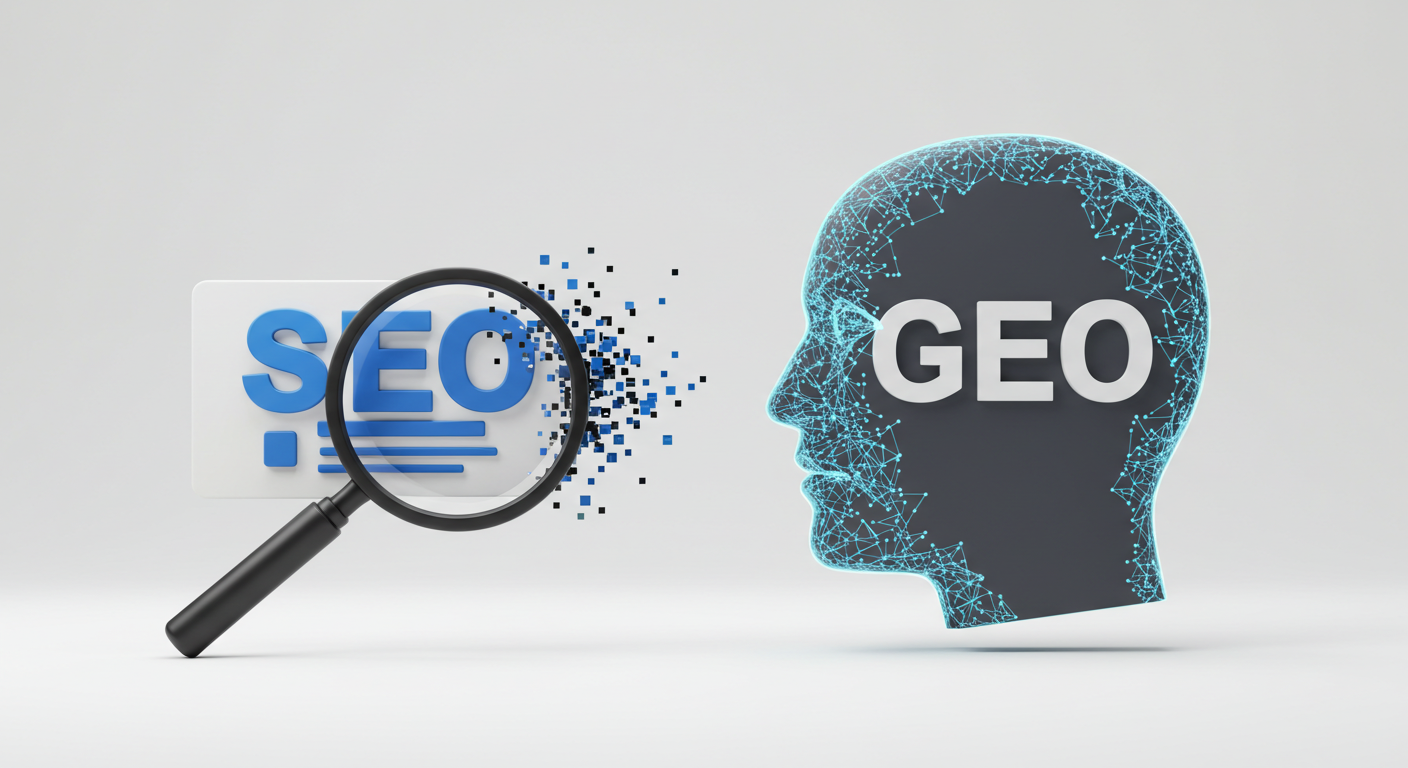Back in the day, the only way to succeed on the internet was to ensure your site worked well with Google’s algorithm. Keywords were the most important factor, backlinks were the second most important, and the click-through rate (CTR) was the best measure to decipher if the SEO was working. However, something robust and silent is happening in 2025: CTR is going away, and GEO is becoming bigger.
Generative Engine Optimization (GEO) has arrived. Now, it’s not enough to just be discovered; you also need to be cited by AI.
From Blue Links to AI Boxes
In the past, SEO was all about getting your page to the top of a list of links. People searched for words, looked at the first few hits, and clicked on one to find out more. That click, and the actions that followed, became the most important way for brands to measure progress.
Search tools that use AI, like Google’s SGE (Search Generative Experience) and Bing Copilot, as well as AI-native engines like Perplexity, have changed the game. Users no longer see a list of results; instead, they get answers right away, often without hitting a single link. These answers can be summaries, bullet points, or direct quotes.
Consequently, standard CTR is no longer useful.
What Is GEO and Why Should Brands Care?
The new method of content visibility, known as Generative Engine Optimization (GEO), optimizes not just for human readers but also for artificial intelligence models that provide responses instantly.
In this new way of thinking:
- The AI acts as a go-between.
- Your content needs to be fact-filled, easy for AI to read, and organized in a way that makes it simple to describe, quote, and show.
- You don’t just want to rank high; you also want to be in the AI’s answer box, even if that means no clicks to your site.
This is how you should think about it: search engines are transforming into answer engines. If your brand isn’t the answer, you’re not seen, even if you technically “rank.”
READ ALSO: Why data culture is the new superpower for modern marketing
Why CTR Is Losing Power
Marketers have been fixated on CTR for decades as a sign of user attention. AI-powered search, on the other hand, fundamentally changes how people engage with content:
- They no longer look at many links at once.
- They trust AI to summarize the best answer.
- Most of the time, they won’t visit your site, even if your information was used.
This means that context, not clicks, is now the point of entry.
How to Win With GEO: The New Optimization Playbook
Change these things if you want your information to matter in the new search world:
- Make your content work for both people and machines. Ensure headers, bullet points, explanations, and outlines are easy to read and structured for AI parsing.
- Put first-party expertise first. AI tools give more weight to sources that are reliable, correct, and easy to understand. Don’t try to get more visitors; instead, be a trustworthy source of information in your area. There should be plenty of FAQs, explainers, and thought leadership that an AI could safely use.
- Don’t just ask questions, think about conversations as well. People don’t type in broad keywords like “best productivity tools 2025.” Instead, they ask, “What’s the best tool for remote teams that works with Notion?” Your content should be ready for these natural-language questions and provide real, useful replies.
- Make your site better for choice, not just ranking. It’s better to be mentioned in an AI report than to be ranked second with no clicks. Pay attention to accuracy, clarity, and importance instead of keyword density.
Where Budgets Are Shifting
More brands are shifting spending on SEO to:
- Content audits for UX and AI usability.
- Frameworks for conversational information.
- Content written by experts (especially about health, money, and technology).
- GEO-focused tools that mimic how AI systems choose what to show.
The search layer that feeds the marketing funnel is changing quickly, but the funnel itself is not broken.
Brands Already Playing the GEO Game
- HubSpot repackages blog material into FAQ-style summaries and AI-friendly forms.
- NerdWallet creates evaluations with brief, extractable data ideal for SGE.
- AI appreciates actual human exchanges; therefore, Reddit and Quora are gaining attention.
It is no longer simply about SEO. It is about being quotable.
The Bottom Line: SEO Isn’t Dead, But It’s No Longer Enough
The rules of exposure are changing in a world where AI performs the searching for people.
It’s possible that CTR doesn’t show the full picture of impact. Moreover, ranking high for keywords doesn’t guarantee people will notice. Now, it’s crucial to be the source that provides the answer.
So, if you’re still optimizing for searches from yesterday, you need to ask yourself: Will your brand be talked about when GEO eats SEO, or will it be left off the page?
ALSO WATCH: MARKETING EDGE ONTV







Comment
No comments found.